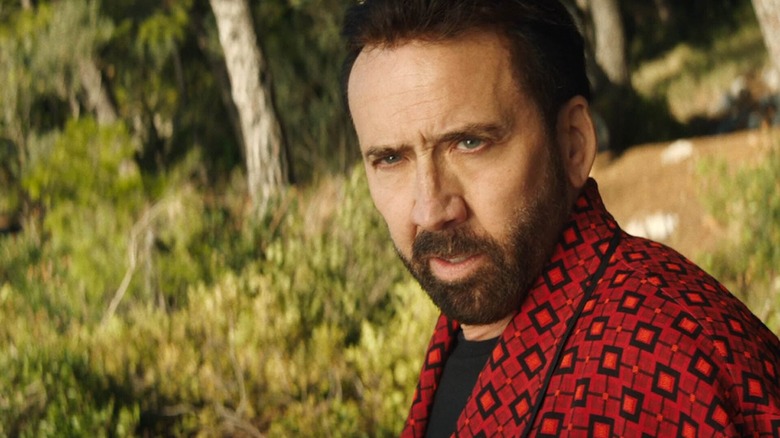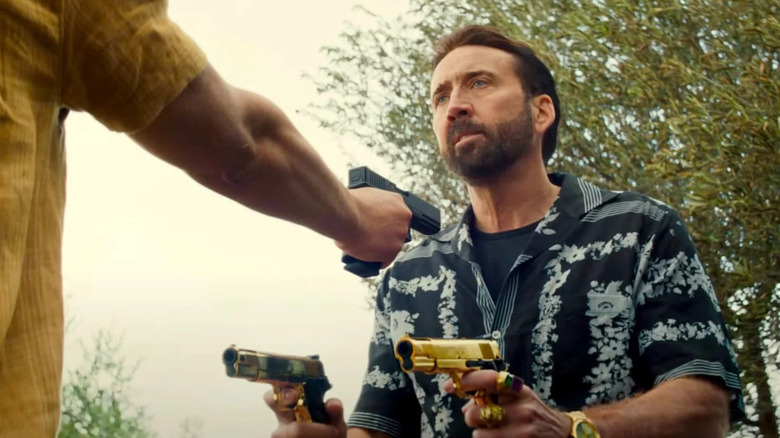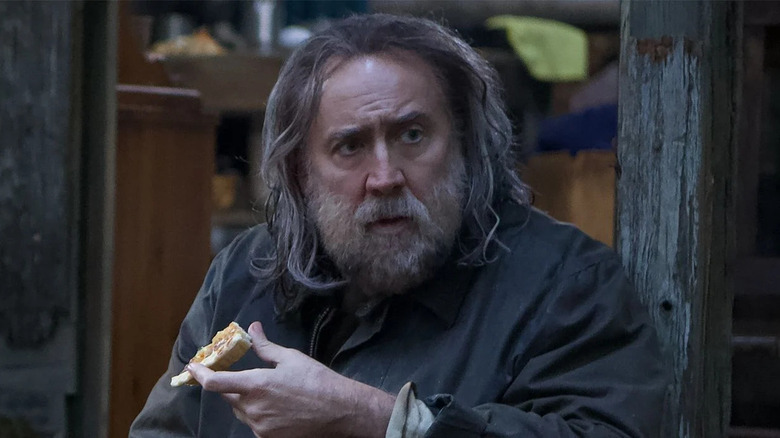Nicolas Cage Has No Regrets About All Those Direct-To-Video Movies, Says He 'Never Phoned It In'
Throughout the mid-to-late 2000s, reports began emerging of actor Nicolas Cage's massive landholdings. In 2005, he sold his home in Malibu — where property values are notoriously high — and purchased a new house, and a whole island, in the Bahamas. He also bought the Schloss Neidstein castle in Germany in 2006, and a massive estate in Rhode Island. In 2007, he bought Midford Castle in Somerset, England. Ultimately, he would be the owner of 25 mansions all over the world. He also secretly purchased a dinosaur skull at auction for $276,000, although When Cage learned that the skull had been stolen, he conscientiously returned it to the Mongolian government. He bought an expensive tomb for himself, got a nice Lamborghini, and even a pet octopus. He bought a copy of Action Comics #1," the first appearance of Superman, for $110,000. Why not be a wealthy movie star if you're not going to spend your fortune on fun, ostentatious things, right?
In July of 2009, the IRS filed a tax lien on Cage to the tune of $6.2 million, and then an additional $6.7 million later that same year. The liens forced Cage to sell off most of his properties and revealed that he was in a great deal of debt. He was sued by one of the residents of one of his properties when he was forced to sell it out from under her. Cage's money handler was largely responsible for most of his land deals, leading to deflation and great financial losses. Cage ended up firing and suing his accountant to the tune of $20 million.
Cage's financials weren't aided by the fact that many of his films from 2008 to 2011 were not enormously successful. "Sorcerer's Apprentice" wasn't a hit, "Ghost Rider: Spirit of Vengeance" attracted a passionate, but small, cult audience, and "Drive Angry," in Cage's words "came and went." To pay the bills, Cage became the face of multiple straight-to-video, lower-budget genre films. From 2014 to 2019, Cage accrued 29 acting credits. Because Cage's financial woes became a matter of public record, many audience members instantly saw Cage's acting output as cynical "doing it for the paycheck" jobs in which he couldn't possibly be invested as an actor.
In a recent interview with GQ Magazine, however, the actor wanted to set the record straight, pointing out that, yes, he did need to work a lot to pay off his debts, but that he was also careful to choose roles that he could engage with creatively.
Fair-weather friends
In the interview, Cage admitted to how expensive life had become for him. The IRS was hounding him at the same time he was trying to keep his mother from being committed to a mental institution, and it was becoming overwhelming. Cage refused to file for bankruptcy throughout, however, and found the straight-to-video market was a great way to earn money quickly. The trade-off: He had to make at least four films a year.
Although one might assume the increased volume of acting work would reduce Cage's capacity for being choosy, Cage only ever took projects that he could engage with:
"When I was doing four movies a year, back to back to back, I still had to find something in them to be able to give it my all ... They didn't work, all of them. Some of them were terrific, like 'Mandy,' but some of them didn't work. But I never phoned it in. So if there was a misconception, it was that. That I was just doing it and not caring. I was caring."
Cage also admitted that he preferred doing smaller films as opposed to the gigantic studio pictures anyway. In the GQ interview, he also admitted that Disney left him high and dry, abandoning a "National Treasure 3" right when he needed it the most, calling big studios mere "Fair-weather friends":
"I enjoy making movies like 'Pig' and 'Leaving Las Vegas' more than I enjoy making movies like 'National Treasure.' When I talk about fair-weather friends in Hollywood, I'm not talking about Jerry Bruckheimer, I'm talking about Disney. They're like an ocean liner. Once they go in a certain direction, you've got to get a million tugboats to try to swivel it back around."
The debt is paid off
Shortly after accepting work on his film "The Unbearable Weight of Massive Talent," in which Cage plays a fictionalized version of himself, and is due in theaters on April 22, 2022, Cage's debts were officially paid off.
Despite his involvement with lower-budget, VOD genre pictures, Cage has never once undersold a role or given anything less than his all. In 2016, he starred in a comedy film called "Army of One" directed by Larry Charles, and he is legitimately funny in that film, even giving himself a namecheck when his character, the real-life would-be vigilante Gary Faulkner, imagines himself as an action star. I admit I missed "Kill Chain," "Running with the Devil," "Between Worlds," "Grand Isle," "Arsenal," "Vengeance: A Love Story" and many of the other films made during Cage's VOD period, but, given what I know about Cage, I will not discount them out of hand.
Cage continues to be attracted to odd, challenging projects, and is always interested in giving a good performance. In his next high-profile project, he will play Count Dracula in the horror-comedy "Renfield," directed by Chris McKay ("The Lego Batman Movie," "The Tomorrow War"). I'll repeat that for those sitting in the back: Nicolas Cage is playing Dracula. The film is due in theaters in April of 2023. One might say Cage is back, but we should perhaps instead acknowledge that Cage never went away.


